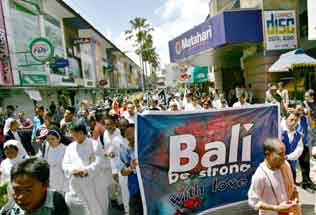|
|
|
October 05, 2005 |
|
| ||

CONSOLATION: Hundreds of laypeople,
activists and religious leaders march in a street alongside Kuta Square
in a show of sympathy for the victims of Saturday night's deadly bombings.
The outdoor rally followed a mass
interfaith prayer on Tuesday. (JP/Berto Wedhatama)
|
Hindus, Muslims unite to fight
terror
I Wayan Juniartha, The Jakarta Post, Denpasar People of different religions joined forces in Bali on Tuesday to denounce the latest bombings, while Balinese Hindus readied to celebrate the victory of good over evil on Wednesday. Some 200 Hindu and Muslim Balinese banged drums, recited prayers and threw flowers into the sea in an interfaith procession to the blast sites on the mainly Hindu island. The mourners, who comprised Muslims, Hindus, Catholics, Protestants and Buddhists, pledged not to let the weekend attacks spark religious divisions in the world's largest majority-Muslim nation. "This attack is savage. We condemn the action. We are here to show solidarity among the various faiths in Indonesia," K.S. Arsana, chairman of the Jakarta-based Hindu Youth Association, was quoted by AFP as saying. Elsewhere, a somber atmosphere prevailed across the resort island, with the Balinese completing their final preparations for the religious festival of Galungan on Wednesday. However, the recent terrorist bombings on Kuta and Jimbaran meant the atmosphere of enthusiasm and noisy anticipation that usually characterized the festival was absent. "There is no way we could celebrate this in joyous manner, not after we were humiliated, insulted and defeated in such a cowardly attack," a mechanic, Made Sandi, said grimly. The sentiment was shared by his relatives, who on Tuesday afternoon were quietly busy decorating a bamboo pole with colorful flowers, fried cakes, young coconut leaves and a piece of white cloth inscribed with a sacred drawing. The decorated pole, known as a penjor, is a symbolic representation of the dragon Basuki, the bestower and keeper of the island's prosperity. The pole is erected next to the house's main gate to signify the Balinese's gratitude toward the Gods' generous blessings. "The Galungan holiday is not stained by godforsaken acts like (the attacks)," Hindu high priest Gde Bang Buruan Manuaba told AFP. "The reason is that we have a certain conviction of peace, which is stronger than the feeling of hostility. The feeling of hostility will be defeated by the feeling of peace." A subdued atmosphere was also observed in Denpasar's traditional main market of Badung, where the city's women shopped for most of the ritual's offerings. Shopping was quick and chatting was brief, with the women conspicuously avoiding any subject related to the bombings. "Completing the ritual preparations is our priority now. Why we should talk about the bombings -- we are supposed to keep our minds calm and clear during the religious day, aren't we," a housewife Ni Made Suratni said. "Talking about the bomb will only make us angry and disturb the sacredness of this day," she said. The Ngeningamg Kayun ritual depends to a large extent on the success of devotees to guard themselves from negative emotions. Cultural observer Cok Sawitri said the Balinese were in a state of suspended anger, maintaining a peaceful predisposition to ensure the success of the Galungan festival. "Their true emotional response to the bombings may manifest days after the completion of the festivals of Galungan and Kuningan," she said. The major festivals which take place twice a year, start with the Tumpek Bubuh ceremony, which falls 25 days before Galungan, and end with the Buda Kliwon Pegatwakan ritual that occurs 35 days after Galungan. |